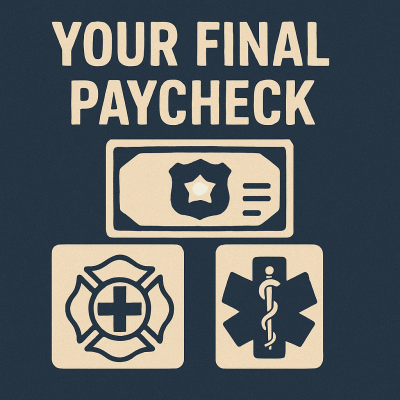After years, sometimes decades, of service, the day comes when you hang up the uniform and step into retirement. Whether you’re a firefighter, police officer, EMT, or any other frontline professional, that final paycheck is more than just a check – it’s the culmination of your hard-earned time off: vacation, holiday, and sick leave accruals.
So, what should you do with it? It’s a question every first responder should consider carefully. Your final accrual paycheck can be a powerful financial tool if you handle it wisely. Depending upon your agency, there are several options that can be available to you:
Option 1: Defer It into Your 457(b) Retirement Plan
Oftentimes, one of the most tax-efficient moves you can make is to defer your final accrual paycheck into your 457(b), 403(b), or 401(k) provided that the payment is for accrued leave and/or compensatory time. Why consider this?
- Tax Deferral: By contributing your final check (or a portion of it) to your plan, you delay paying income taxes on that money. Instead of being taxed this year, those funds can grow tax-deferred until you withdraw them in retirement.
- Extra Contributions in the Year You Retire: Some 457(b) plans offer special catch-up provisions, allowing you to contribute more than the standard annual limit in the year you retire. This can be an excellent way to boost your retirement savings with a lump sum.
Tip: Contact your plan administrator before your retirement date to find out exactly how much you can defer and to complete any necessary paperwork and always consult with a tax professional to get the full understanding of any tax savings! The earlier, the better, especially if payroll deadlines are tight.
Option 2: Take It as one big final paycheck (ordinary income)
If you prefer, you can simply take the final paycheck as cash, just as you would any regular paycheck. It will be subject to ordinary income taxes in the year it’s paid though which could increase your annual burden. Why might this be right for you?
- Immediate Cash Needs: If you have upcoming expenses like travel, home repairs, or medical bills, or simply want a cash buffer, this may be the right move.
- Debt Payoff: Some retirees use this final check to pay down credit cards, car loans, or other high interest debt. We often recommend this strategy rather than investing the money because paying off debt is a guaranteed return on your money.
- Already Maxed Out: Many first responders who are late in their career are making hefty contributions to their plan. If you’ve already come near to, or hit your contribution limits, this might be your only option.
Heads up: Because this check can be large, it might bump you into a higher tax bracket for the year. Plan accordingly to avoid surprises when tax season comes and don’t hesitate to get some guidance from a CPA to be safe.
Option 3: Deferral to a Medical Savings Account
- Retiree Health Savings (RHS): An RHS account, is a type of employer-sponsored, tax-exempt account used to help employees pay for eligible healthcare expenses during retirement. It’s designed to help cover costs not covered by insurance or other benefit plans. These plans are income tax free, as long as the money is used for medical needs. The RHS can be a great benefit that is often overlooked by HR/Benefits directors. If your agency does not have one, you might consider asking your Benefit Director to look into getting one.
- Health Savings Account (HSA): Some employers may allow direct contributions from your final leave paycheck to your HSA if you have one. Even if your employer doesn’t allow that, you can still consider taking taxable funds from your final check and making the tax-deductible contribution yourself, if you haven’t already done so for the year.
So, Which Option Is Right for You?
The answer depends on your unique financial situation and retirement goals. Here are a few questions to guide your decision:
- Do you want to reduce your tax burden this year?
- Are you financially prepared to wait before accessing that money?
- Do you have large expenses planned shortly after retirement?
- Have you already maxed out your 457(b), 403(b) or 401(k) contributions? If so, you might consider waiting to retire until after January 1st when contribution maximums reset.
Consulting with a financial advisor or retirement planner like FinancialCop, and a qualified tax professional can help you weigh these options and align them with your long-term financial plan.

Mike Parker
Partner / Vice President

